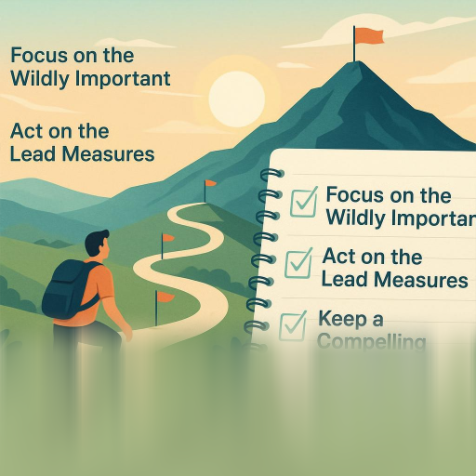The 4 Disciplines of Execution (4DX) are widely used in organizations to drive business results—but their power extends far beyond the workplace. Whether you want to get in shape, write a book, improve your finances, or deepen your relationships, the 4DX framework can help you turn personal goals into consistent action.
In this article, you’ll learn how to apply each of the 4 disciplines in your everyday life to stay focused, build momentum, and actually achieve the goals that matter most to you.
Why 4DX Works Outside the Office
Many personal goals fail not because of lack of desire, but because of lack of structure. We rely on willpower and good intentions—but those aren’t sustainable.
The 4DX model gives you:
- Clarity: You focus on one big result
- Strategy: You track meaningful actions
- Visibility: You measure progress
- Accountability: You stay on track with regular reviews
It brings systematic thinking to your personal goals—without the stress.
Discipline 1: Focus on the Wildly Important Goal (WIG)
We all have multiple aspirations—health, learning, money, relationships. But trying to tackle them all at once leads to overwhelm.
Instead, choose one Wildly Important Goal to focus on for the next few weeks or months.
Examples:
- “Lose 5kg by August 30”
- “Read 10 books in 3 months”
- “Save $2,000 for a trip by December”
Your WIG should be specific, measurable, and time-bound. Make it exciting—but realistic.
Discipline 2: Act on the Lead Measures
You can’t control results, but you can control actions. Lead measures are the small, daily or weekly activities that drive big outcomes.
Examples:
- WIG: “Lose 5kg”
- Lead measures: Walk 5,000 steps/day, track meals in app
- WIG: “Save $2,000”
- Lead measures: Skip takeout 3x/week, deposit $100 every Friday
- WIG: “Read 10 books”
- Lead measure: Read 30 minutes before bed each night
Focus on what you can do, not just what you want to get.
Discipline 3: Keep a Compelling Scoreboard
Seeing your progress keeps you motivated. It reminds you that you’re winning—even if it’s slow.
Your personal scoreboard doesn’t need to be fancy. Try:
- A habit tracker app
- A physical wall calendar
- A spreadsheet with color-coded progress
- A bullet journal with weekly check-ins
Visuals matter. The more you see it, the more you care.
Discipline 4: Create a Cadence of Accountability
Even when you’re working solo, you need a system to review, reflect, and recommit. That’s where accountability comes in.
Options:
- Weekly planner review: What did I do? What’s next?
- Partner check-ins: Share progress with a friend every Sunday
- Journal reflections: Write about wins, challenges, and next steps
Don’t skip this step. Consistency is more important than intensity when it comes to personal goals.
Sample Use Case: Writing a Book
Let’s say you’ve dreamed of writing a novel.
- WIG: Finish a 60,000-word draft by October 1
- Lead measures: Write 500 words/day, review outline weekly
- Scoreboard: Daily word count chart on your wall
- Accountability: Weekly reflection + call with a writing buddy
Using 4DX, your dream becomes a system. Progress becomes visible. Momentum builds.
Tips for Success
- Limit your goals: One WIG at a time. Two max.
- Celebrate effort, not just results: Showing up daily builds identity.
- Keep it visible: Out of sight = out of mind.
- Use habit stacking: Attach lead measures to existing routines (e.g., “After brushing my teeth, I read for 30 minutes.”)
- Review weekly: This is where the magic happens.
Why This Approach Works
The 4DX method turns abstract hopes into tangible action. It provides just enough structure to keep you focused, without overwhelming you with complexity.
It respects your time. It builds habits. It creates wins.
Whether you want to change your body, your finances, or your mindset, 4DX gives you a clear path forward—one week at a time.
